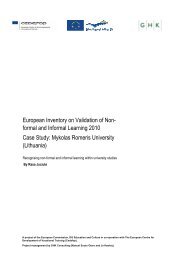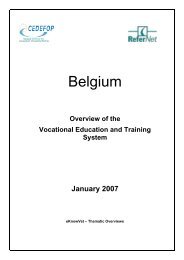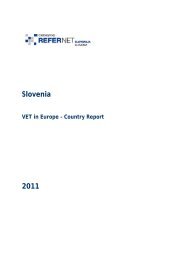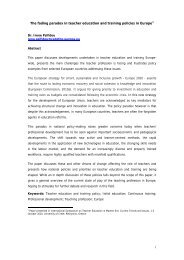PROFF – Professionalisation of VET teachers for the future - Europa
PROFF – Professionalisation of VET teachers for the future - Europa
PROFF – Professionalisation of VET teachers for the future - Europa
You also want an ePaper? Increase the reach of your titles
YUMPU automatically turns print PDFs into web optimized ePapers that Google loves.
2. Objectives, methodology and terminology2.1. ObjectivesAs described above, <strong>the</strong> <strong>PROFF</strong> project takes as its point <strong>of</strong> departure <strong>the</strong> findings <strong>of</strong> <strong>the</strong>Helsinki workshop and <strong>the</strong> challenges identified at <strong>the</strong> workshop.The goal <strong>of</strong> <strong>the</strong> <strong>PROFF</strong> project is to study <strong>the</strong> way in which EU Member States are facing<strong>the</strong>se challenges (see figure below, entitled ‘<strong>Pr<strong>of</strong>essionalisation</strong> <strong>of</strong> <strong>VET</strong> <strong>teachers</strong> <strong>for</strong> <strong>the</strong><strong>future</strong>’).New target groups: <strong>VET</strong> <strong>teachers</strong> today have to deal with more diverse target groups thanever be<strong>for</strong>e. One <strong>of</strong> <strong>the</strong> effects <strong>of</strong> lifelong learning is an increasing number <strong>of</strong> adults entering<strong>VET</strong> programmes. A critical challenge <strong>for</strong> <strong>VET</strong> is to find ways <strong>of</strong> teaching adults which takeproper account <strong>of</strong> <strong>the</strong>ir previous pr<strong>of</strong>essional and life experience, <strong>the</strong>ir variable skills and <strong>the</strong>irattitudes, which may be very different to those <strong>of</strong> younger people. In some cases it may benecessary to deal with significant resistance to learning.Changing paradigms in educational <strong>the</strong>ory: recent years have seen rapid changes ineducational <strong>the</strong>ory which now focuses on learning ra<strong>the</strong>r than techniques <strong>for</strong> ‘transmitting’in<strong>for</strong>mation by <strong>teachers</strong>. The teacher’s role becomes that <strong>of</strong> a ‘coach’ or ‘facilitator’. Thiscalls upon <strong>teachers</strong> to plan and differentiate <strong>the</strong>ir teaching to take account <strong>of</strong> students’different learning styles. Optimal teaching requires <strong>teachers</strong> to apply a broad range <strong>of</strong> teachingmethods, including project work, workshops, case studies, etc. The challenge <strong>for</strong> <strong>VET</strong> is howto integrate <strong>the</strong>se methods into national <strong>VET</strong> systems and to equip <strong>teachers</strong> to use <strong>the</strong> newmethods in <strong>the</strong>ir day-to-day classroom practice.ICT development: one <strong>of</strong> <strong>the</strong> key technological developments <strong>of</strong> <strong>the</strong> last three decades hasbeen <strong>the</strong> rapid development <strong>of</strong> ICT which has invaded every field <strong>of</strong> business and now has asignificant impact on education. Today all <strong>VET</strong> <strong>teachers</strong> require general skills in ICT <strong>–</strong> notjust because <strong>the</strong>ir students will need ICT skills to meet <strong>the</strong> needs <strong>of</strong> <strong>the</strong> labour market <strong>–</strong> butbecause <strong>teachers</strong> <strong>the</strong>mselves are increasingly expected to use ICT as a teaching tool, as well as<strong>for</strong> administration. To keep up with students and <strong>the</strong>ir demands <strong>VET</strong> <strong>teachers</strong> need to findinnovative ways <strong>of</strong> using a computer in <strong>the</strong>ir jobs. This means <strong>the</strong>y have to become familiarnot only with e-learning but also with ‘blended models’ in which e-learning is integrated withclassroom teaching, group work, seminars, etc. This poses <strong>the</strong> problem <strong>of</strong> how best to provide<strong>teachers</strong> with <strong>the</strong> technical and non-technical skills <strong>the</strong>y need to take advantage <strong>of</strong> <strong>the</strong>seopportunities.Labour market development: The institutions that provide vocational education and trainingexist to serve <strong>the</strong> business community, which demands that young people leaving vocationaltraining should have immediately useful skills. If <strong>teachers</strong> fail to keep up to date with newtechnologies and new working practices, vocational schools will produce candidates who do13
















